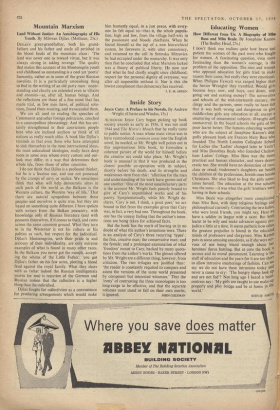Educating Women
I DON'T think one realises quite how brave and patient the women of the past were who fought for women. A fascinating question, even more fascinating than the women's courage, is the problem of the opposition. The men and women who opposed education for girls tried to make reason their cause, but really they were emotional. When Philippa Fawcett was ranged higher than the Senior Wrangler they trembled. Would girls become boys now, and boys, cast down, stop going out and earning money? The universities and schools of the mid-nineteenth century, the clergy and the parents, seem really to have felt that it was both wrong and dangerous to give middle-class girls any education at all, except a smattering of ornamental subjects, ill-taught and unmastered. In the board schools the girls of the poor learnt better. The famous educating women who are the subject of Josephine Kamm's dog- gedly pleasant book are Frances Mary Buss who founded The North London Collegiate School for Ladies (the 'Ladies' changed later to 'Girls') and Miss Dorothea Beale who founded Chelten- ham Ladies' College. Miss Buss was the more practical and human character, and more demo- cratic too. She would have no distinction of race, class or creed; tradesmen's daughters sat beside the children of the professions, Jewish ones beside Christians. She also liked to hug the girls some- times herself. The education at the two schools was the same—it was what the girls' brothers were having in their schools.
Miss Beale was altogether more complicated
than Miss Buss, with deep religious feelings and philosophical curiosity. Contrasting the two ladies, who were loyal friends, you might say, Here We have a soldier in league with a saint. But both learnt to be wily and make advances against pre- judice a little at a time. It seems pathetic how often the greatest prejudice is found in the educated minds of professors and clergymen. Miss Kamm puts in some amusing anecdotes, as if she were ner- vous of not being bland enough about her heroines' fierce battling. But at core the book is serious and its moral paramount. Learning is the stuff of education and the years for it are too short to allow intrusive smatterings of fashion. Can Nve, say we do not have these intrusions today and never a cause to cry : 'The hungry sheep look up and are not fed'? Not long ago I heard a head- mistress say: 'My girls are taught to use make-up properly and play bridge and be at home in the world.' STEVIE SMITH ti


































 Previous page
Previous page